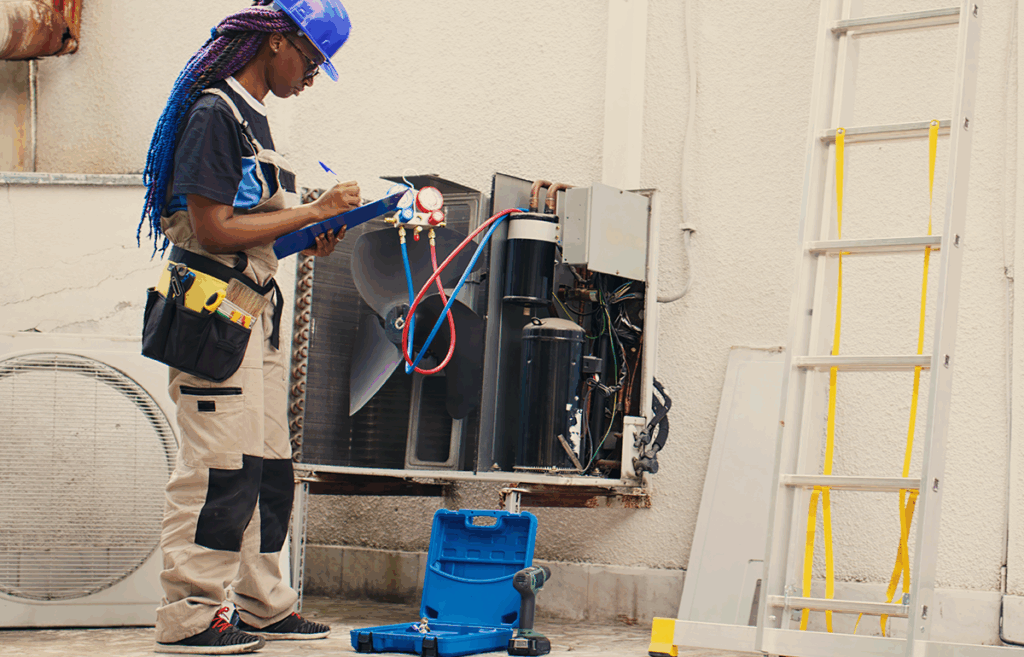
In an ideal world, your HVAC equipment and systems would never break or shut down. But it can happen. Even non-emergencies can become disruptive to your operations. Just look at how many HVAC projects we’ve done where we had to account for when and how to carry out the work to ensure there was little to no disruption.
While it’s great to hope for the best, it’s also important to plan for the opposite outcome. In other words, if that day ever comes when you have an HVAC emergency, be ready to minimize disruption before it happens.
1. Have a Recovery Plan Ready to Go
The first thing to do is take stock of all your HVAC equipment. Knowing what you have, where they are, and what zones they impact will be helpful in coming up with a disaster recovery plan.
Let’s say you oversee the facilities at an elementary school. The boiler has gone out in one zone that includes numerous classrooms along with the cafeteria and library during January. What’s your plan for when that happens?
- Do you shut down school until it’s fixed?
- Do you bring in portable heaters to warm these spaces?
- Will you move students from unheated classrooms to other spaces? Which ones?
- Could you host lunch in the gymnasium or auditorium? Or will they be fully occupied?
It might seem pointless spending time putting together a plan. However, HVAC emergencies don’t just disrupt operations. They can also impact the health of the people, quality of your products, or state of your equipment if they go on for too long.
If you haven’t done so already, put together that list of HVAC equipment. Then identify which equipment failures will impact the most critical zones in your building. Focus on creating a plan for them first.
2. Get a Temporary Cooling or Heating Solution
If you can’t afford to shut things down and don’t have the ability to shift things around until the issue is resolved, another thing to try is bringing in a portable, temporary solution.
The list you created in the point above will be handy here. By knowing what equipment you have and how severely they will impact operations if they stop working will help you narrow down what areas to focus on.
Let’s use the school example again. Let’s say everything is meticulously scheduled around the school and you don’t have the flexibility to shift students and teachers around when the heat goes out in one or more zones.
If you have portable heaters stored away, instruct your staff to bring them into the spaces that need them. This will provide temperature control and comfort until a professional can come on site and fix the issue.
If you don’t have any temporary heating or cooling equipment for your building, you can always rent them from an HVAC provider like Dean E. Norris. Not only are they useful for emergencies, they come in handy during unseasonably hot or cold weather as well as during scheduled maintenance.
3. Schedule Regular HVAC Maintenance
HVAC maintenance involves more than cleaning and servicing your equipment. With each visit, your HVAC partner will inspect your entire system to ensure that everything is in good working order.
If issues are found, they’ll bring them to your attention. You’ll receive recommendations regarding repairs and replacements along with estimates and a timeline for the work.
By scheduling seasonal HVAC maintenance, you’ll be able to prevent many smaller issues from becoming full-blown emergencies weeks or months down the road. What’s more, regular maintenance can help extend the life of your HVAC equipment, which will save you money on repairs and new equipment purchases on top of avoiding costly emergency situations.
4. Have a Go-to HVAC Partner
Another thing you can do to proactively prepare for an emergency and limit downtime is to find yourself an HVAC partner. There are a number of reasons to do this.
For starters, when an emergency arises, there’s no time to waste. The last thing you’ll want to be doing in this situation is scouring Google for HVAC contractors in your area and calling around to figure out which one is right for the job.
Also, it’s important to have a contractor that you know you can call day or night, not just during their business hours. Dean E. Norris, for example, has team members on call 24/7 for emergency assistance.
Another reason to get yourself an HVAC partner is familiarity. If your contractor already knows the ins and outs of your HVAC setup from prior visits or maintenance appointments, they’ll likely be able to diagnose and repair the issue more quickly than anyone else.
Minimize Disruptions and Downtime During HVAC Emergencies
HVAC emergencies are stressful. It could be any number of things that cause an emergency — from outdated equipment to a broken ignition — and it’s not always a fast and simple fix.
However, preparing in advance for emergencies can help you and your HVAC provider get through the situation much more smoothly. To start, be proactive and come up with a plan and have some temporary cooling or heating solutions on hand. Then, find yourself an HVAC partner who can handle not only these emergency situations, but routine maintenance, too.
If you don’t yet have an HVAC partner you can depend on, reach out and let us know. We’d be happy to help.
